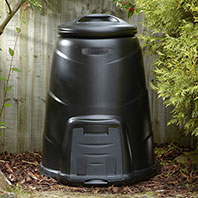Home composting
Compost giveaway
On Saturday 18 May 2024 we will be hosting our annual compost giveaway for Dacorum residents at Cupid Green Depot, Redbourn Road, Hemel Hempstead, HP2 7BA.
Compost is limited to two bags per car and will be on a first-come, first-served basis from 8am. Please arrive early to avoid disappointment.
The compost - which is provided by Envar, the company that processes our garden waste - will be pre-bagged and our crews will load it into your vehicle for you.
We look forward to seeing you there.
About home composting

It’s easy to recycle your garden waste at home by composting it. A compost bin can also be used to recycle some of your food waste, including tea bags and fruit and vegetable peelings. Over time, this inexpensive and natural process will break down your waste and become a rich soil improver for your garden. Compost can be used for pot plants, flower beds, vegetable patches and even lawns.
Find out more and buy compost bins at a discounted rate on the Hertfordshire WasteAware website.
Benefits of composting
- Saves money - no need to buy compost again
- Reduces the amount of waste going to landfill, resulting in fewer greenhouse gas emissions. Home compost also reduces the dependence on peat products, which are dug from important ecological sites
- Provides an excellent soil conditioner, adding organic matter and nutrients to improve poor soils
- Helps maintain healthy plant growth, suppressing plant diseases and pests while improving the microbial and worm population of the soil.
What can be composted?
To get the best compost it is best to add an equal mixture of "greens" and "browns".
- Greens are wet items such as tea bags, vegetable peelings, grass and fruit.
- Browns are dry items such as leaves, dead plants, cardboard and paper.
More information on composting is available on the Recycle Now website or the Hertfordshire WasteAware Partnership website.
What are the alternatives?
If you choose not to compost at home, please continue to recycle your food waste in your food waste caddy. Remember, unlike a home composter your kerbside food waste collection is for all food waste including meat, cooked vegetables and plate scraps.
If you wish to recycle your garden waste in your green-lidded bin, you can sign up to our Garden Waste Subscription Service at an annual cost of £45 per bin.
Biodegradable plastic
Compostable and biodegradable plastics come in many different varieties - not all of these can be put in your home composter. Only put compostable or biodegradable plastics in your home composting bin if they have the following symbols:
.jpg?sfvrsn=c8a61b9e_2)
If they do not have these symbols, please make sure to place them in your grey bin.
Please note: no compostable plastics are accepted in your green-lidded bin. For more information, please visit the Hertfordshire WasteAware biodegradable plastics page.
Free compost bin for schools
Every school in Hertfordshire is entitled two free compost bins. Email wasteaware@hertfordshire.gov.uk to order.